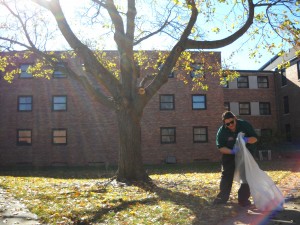
About 25 students cleaned up Central Michigan University on Monday. Photo: Alice Rossignol
To kick off Native American Heritage Month — a month where Native Americans and their culture are celebrated — the North American Indigenous Student Organization of Central Michigan University hosted an environmental awareness day. Students cleaned up campus to honor the Native American tradition of taking care of mother Earth.
Listen to the story:
Story Transcript:
On Monday afternoon about 25 students gathered in the University Center at Central Michigan University in Mount Pleasant, Mich.
Soundbite: [go ahead and grab two trash bags each and some gloves…]
Armed with blue, plastic gloves, trash bags and metal tongs, they cleaned up the campus to honor mother earth as part of a student organization’s Third Annual Environmental Awareness Day.
The event kicked off Native American Heritage Month — four weeks filled with activities, celebration and education.
Colleen St. Onge is one of the coordinators of the clean-up:

Colleen St. Onge was one of the event coordinators. Photo: Alice Rossignol
St. Onge: Basically, it was started a few years back by a fellow student, also a member of NAISO. Just saying, you know, it’s time that we start cleaning up campus and, you know, honoring our traditional beliefs.
NAISO, or the campus’ North American Indigenous Student Organization, hosted the event.
Hudson: We’re here to support, like, the native students specifically,
CMU senior Josh Hudson is the group’s president.
Hudson: but also the university campus as a whole to provide cultural education about Native American life and culture.
About 220 students at the university identify themselves as Native American.
Central Michigan University is represented by the Chippewas — named for the Saginaw Chippewa Indian Tribe in the area. The tribe is made up Ojibwe bands. Whether this chosen mascot is good or bad is a touchy subject, Hudson tells me, and opinions vary depending on whom you talk with. But education, he says, is key.
Hudson: I think it’s really important, because if we’re going to carry the name we’re carrying there should be a lot of education done. You know so students really know and understand like what’s going on, why we have the name, and what it’s supposed to represent.
Hudson says that many people don’t understand aspects of Native American culture, like how the culture views the impact of our environmental actions.
Hudson: Within Native American culture there’s this, like, hindsight look that what we’re doing today will impact the next seven generations. So things that you do today will affect your grand children and their grandchildren will be affected and that’s what really, I think, is a big message from our culture that a lot of people don’t see.
I tagged along with some of the students involved in the clean-up.
[Soundbite: I’m like, hey look there’s a piece right there get that one! (laughter) I want that big thing right there!]
Like freshman Sarah Taylor who came because she needed volunteer hours. But she still thinks cleaning up the campus is important.
Taylor: Yeah because if no one picked it up then we’d been living in it!
Eventually the clear bags began to fill…
[soundbite: trash bag]
…with paper, metal cans, wrappers, remnants of Halloween costumes worn over the weekend, and other items.
[soundbite: someone just decided to spit their gum out once again…]
The volunteers spent four hours filling a total of 35 trash bags.
The event cleaned up the campus and allowed participants to focus on a common denominator: the planet.
Hudson: And so I think that this event is really good because it helps bridge you know the communities within the university, you know, because the Earth is something that we all have in common, regardless of your culture, you creed, your religion. You do understand that everybody’s connected to each other through the Earth.
For Great Lakes Echo, I’m Alice Rossignol.
